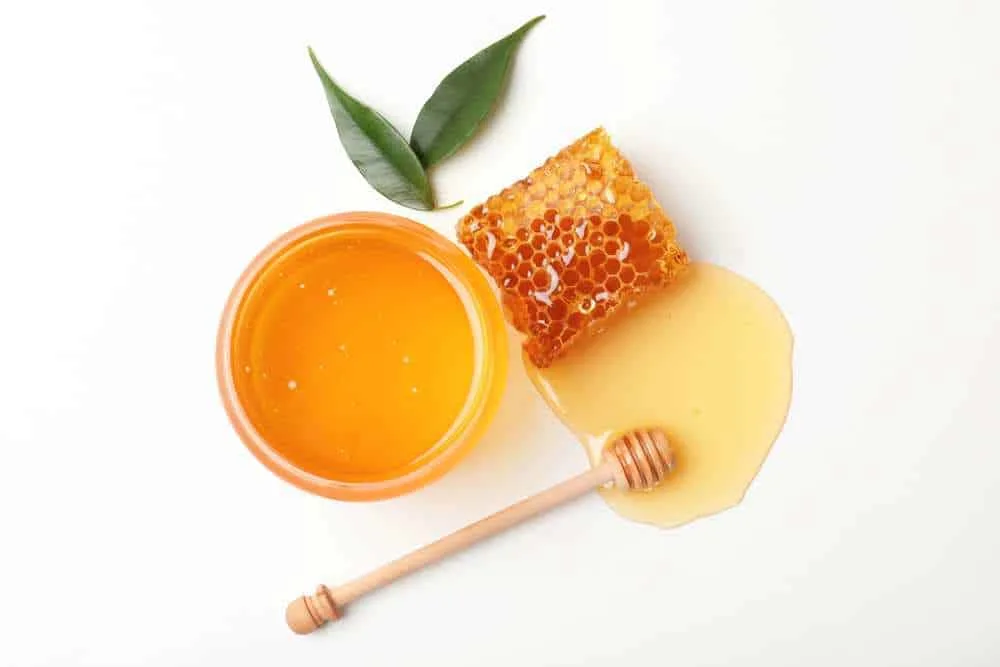Can Dogs Eat Honey? It’s not uncommon for dogs to enjoy a sweet treat now and then. My dog likes sweets so much he’ll try to steal and eat my fruity lip balm if I’m not careful!
The problem is that many artificial sweeteners – like Xylitol – can be dangerous or even deadly for dogs. Even some foods that are naturally sweet – like grapes or raisins – can make dogs sick.
The good news is that honey does not fall into this category. It is usually safe for dogs to eat in small quantities – we’re talking a teaspoon a day, max – and it has a lot of natural benefits. There are certain times you should never feed your dog honey, though, as it may cause health problems or make existing problems worse.
Let’s take a look at some of the benefits of honey, and when you should – and shouldn’t – feed it to your dog:

The Benefits Of Honey
Honey is a natural sweetener that has a lot of healthy components and beneficial applications.
Honey includes useful vitamins, minerals, and compounds such as:
- Vitamins C, D, E, K, and B complex
- Enzymes that are needed for healthy chemical reactions
- Antioxidants including phenolic acids and flavonoids
- Natural sugars
- Iron
- Potassium
- Magnesium
- Calcium
- Zinc
You should know that commercially processed honey usually does not contain the majority of these compounds. That is because the heating and refining process that honey goes through in the big commercial plants generally destroys a lot of the beneficial elements.
If you are going to feed your dog honey, you should always go with raw, locally sourced options. These can generally be found in farmers’ markets or locally supplied grocery stores.

Why You Should Feed Honey To Your Dogs?
The components listed in the last section can be incredibly healthy for your dog and can help add some much-needed vitamins and minerals to his or her diet.
There are a few other specific ways honey may help your dog, though, which include the use of honey as a natural sweetener and digestion aid, its inherent antibacterial, and anti-inflammatory properties, and the potential for honey to help reduce allergies.
1. Natural Sweetener
As I mentioned before, some dogs can have a huge sweet tooth, but it’s hard to find sweet things that dogs can safely eat. Honey is a great substitute for unhealthy or potentially dangerous sugars or sweeteners.
It is possible to find some pre-made treats that use honey. I decided to make my own treats, though, since I had a hard time finding healthy options.
If you want to make healthy, honey-inclusive treats, you will need the following:
- 5 Cups Whole Grain Oats
- 1 Can Pumpkin
- 1/2 Cup Peanut Butter
- 4 Tablespoons Honey
Simply mix the ingredients together in a large bowl and form them into balls or fun shapes. This makes a month’s worth of treats for my Siberian Husky who goes nuts for them! Store the treats in the freezer to keep them fresh and add some extra crunch. You can also half the recipe if you have a smaller dog.
2. Digestion Aid
Another good reason to feed your dog treats with honey is that it can help with several digestion issues. Regular doses of honey may also help prevent dogs from developing digestion or gastrointestinal problems.
Some potential problems that honey can help with include colitis, irritable bowel disease, gastritis, an overgrowth of harmful bacteria, and an imbalance of the natural gut flora that helps keep things running smoothly.
Most dogs will struggle with digestion issues at some point in their lives. Adding a little honey to your dog’s diet may help prevent these issues. If your dog does develop problems along these lines, a little extra natural honey may be a good option to keep in mind.
3. Antibacterial Properties
One of the reasons honey can help with digestion issues is its natural antibacterial properties. Letting your dog eat honey can help regulate internal bacteria. Honey can also be applied topically to cuts, scrapes, hotspots, and even mild burns. This can fight infection and help the skin grow back faster and healthier.
You may need to wrap a honey-treated wound loosely to keep your dog from licking it clean. Since honey is safe for dogs to eat, though, you don’t have to worry about it making them sick if they do lick it off!
4. Anti-inflammatory Properties
Honey also has some natural anti-inflammatory properties. This is another reason it can help with wound care as it can prevent redness and swelling.
The anti-inflammatory aspects can also help with things like arthritis and joint pain. Adding some honey to your dog’s diet can help with the symptoms of these illnesses along with other inflammatory or movement problems like stiff limbs, pulled muscles, and over-extended joints.
5. Possible Allergy Reducer
While there is no scientific evidence to back up this claim, honey has long been regarded as a possible way to deal with allergies. Humans will often eat locally sourced honey to help build up a tolerance for locally blooming plants. The idea is that this reduces seasonal allergies. Some have even claimed this will eliminate seasonal allergies altogether!
Honey can do the same thing for dogs; consuming local honey can help reduce seasonal allergies or skin allergies. It’s important to make sure it’s locally sourced, though. This only works if the honey contains pollen from the plants in the area that are triggering an allergic response in the first place.

Why You Shouldn’t Feed Honey to Your Dogs?
As beneficial as honey can be, there are times when you shouldn’t feed it to your dogs. Honey can actually be harmful if fed in large quantities or given to puppies, immuno-compromised dogs, or obese or diabetic dogs.
1. Puppies And Immuno-Compromised Dogs
You should never feed honey to a dog who is less than one year old. Honey can contain spores that can cause botulism in puppies. Botulism is a potentially deadly disease that can cause paralysis and difficulty breathing.
Dogs that are fully grown have a different acidic balance in their stomachs that can negate any potential botulism spores. Puppies have underdeveloped immune and digestive systems, though, which means they are less likely to be resistant.
Because of this, you also shouldn’t feed honey to dogs with lower or compromised immune systems either. They may also be susceptible to developing botulism from honey.
2. Obese Dogs
You should also avoid feeding honey to obese dogs. Honey has 64 calories per teaspoon. That is a lot of extra calories when it comes to dogs!
If your dog is overweight and you’re trying to get it to a healthier place on the scale, don’t compound the problem by feeding them high-calorie foods. For as many benefits as honey has, it’s not worth the extra calories if your dog already needs to lose some weight.
3. Diabetic Dogs
Honey is considered moderate on the glycemic index. This means that it can raise blood sugars rapidly before they crash again. This effect isn’t as pronounced as it could be with other sweeteners high on the index, but it is enough of a spike to cause problems for diabetic dogs.
If your dog has diabetes, you should try to limit its sugar intake as much as possible. Consult with your vet for the best way to do this, but chances are, they’re going to tell you to steer clear of sweeteners like honey.

Final Thoughts
Honey has a lot of beneficial properties that can help your dog. Feeding your pet honey can give them a nice sweet treat, help deal with digestion issues, prevent infection, reduce inflammation, and even reduce or eliminate allergies.
Honey needs to be regulated, though. You should never feed your dog more than a teaspoon a day. You also shouldn’t give honey to puppies and dogs with bad immune systems, obesity, or diabetes. However, if you’re smart about your honey use, it can be a wonderful, natural treat for your dog that is healthy and helpful in a variety of ways.
Learn More: What Can Dogs Eat? A Comprehensive List Of Dog-safe Foods


